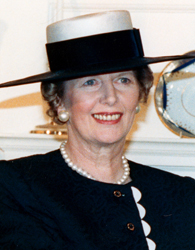Known as the “Iron Lady,” British Prime Minister Margaret Thatcher was the first woman to lead a Western democracy, a position she held for 11 years.
Margaret Thatcher’s Early Days
The future prime minster was born Margaret Roberts in Grantham, England on October 13, 1925. Her father, Alfred Roberts, played a key role in the development of young Margaret’s interest in politics. He was a grocery store owner of modest means who was forced to quit school at the age of 13 to begin working. Roberts’s real interest, however, was politics, and he often discussed politics with his young daughter. Thatcher later said of her father, “He taught me that you first sort out what you believe in. You then apply it. You don’t compromise on things that matter.”
In 1943, Thatcher was accepted to Oxford University. She studied chemistry at Somerville College for four years, and after graduation found a job in a plastics factory. Throughout her university years Thatcher never lost interest in politics, serving as president of the Oxford student Conservative Association. In 1950, the 25-year-old ran as the Conservative candidate for the Dartford seat, then held by Labour. Although she lost the race, she drew national attention and gained valuable political experience.
In 1951, she married Dartford businessman Denis Thatcher. She gave birth to twins, Mark and Carol, in 1953. Motherhood wasn’t all that occupied Thatcher in the 1950s: she also studied law and became a lawyer, specializing in taxation and patents.
Sources in this Story
- PBS: Commanding Heights: Margaret Thatcher
- Margaret Thatcher Foundation: Biography
- Time: The Time 100: Margaret Thatcher
- BBC: Historic Figures: Margaret Thatcher (1925–2013)
- BBC News: Thatcher dementia fight revealed
- findingDulcinea: On This Day: Margaret Thatcher Steps Down as Britain’s Prime Minister
Thatcher’s Notable Accomplishments
Margaret Thatcher earned her first political victory in 1959, when she won the Finchley district Parliamentary seat. As a member of Parliament, she served as joint secretary of Pensions and National Insurance (1961–1964) and secretary of Education and Science (1970–1974). In February of 1975, Thatcher defeated Edward Heath to win the position of leader of the Conservative Party. When the Conservative Party came into power in 1979, Margaret Thatcher became the first female prime minister of Britain.
Thatcher’s first major political challenge was Britain’s failing economy. Unemployment in Britain had doubled from 1979 to 1980, and Thatcher’s popularity was one of the lowest ever recorded.
On April 5, 1982, Britain responded to Argentina’s invasion of the Falkland Islands by deploying Navy vessels to the region. After the Argentinean battleship General Belgrano was sunk and Port Stanley was captured, Argentina surrendered on June 14, 1982. The effect of Britain’s victory in the Falkland Islands was a huge boost in popularity for Thatcher, leading to a victory for her and the Conservative Party in the 1983 general election.
Thatcher had a close relationship with President Ronald Reagan; they shared a hatred of communism and a belief in free-market economics. Her strong stance against Soviet expansionism earned her the nickname the “Iron Lady.” She won a third term as prime minister in 1987, but her popularity began to dwindle again. Her policies concerning the poll tax, a system allotting a fixed taxation amount per person, and her resistance to closer ties with Europe, led to Thatcher’s resignation as party leader in November 1990.
The Rest of the Story
Margaret Thatcher remained an influential political figure throughout the 1990s. In 1992 she left the House of Commons and joined the House of Lords as Baroness Thatcher of Kesteven. She published two best-selling memoirs, “The Downing Street Years” (1993) and “The Path to Power” (1995), and traveled the world giving lectures.
Thatcher’s legacy is one of conservative economic and social policy, and hardline foreign policy. She endured great unpopularity, and narrowly escaped a 1984 IRA bombing at a Conservative Party meeting in Brighton. After several strokes weakened her health, Margaret Thatcher retired from public life in 2002, and she died on April 8, 2013, in London.
This article was originally written by Caleb March; it was updated October 17, 2017.











